Opinion & Analysis
Smartphones and competitive golf
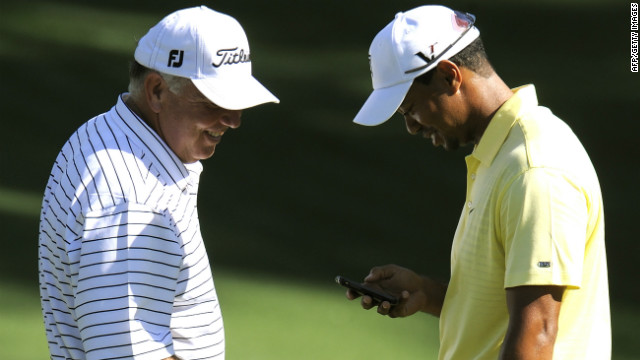
By Chris Hibler
GolfWRX Contributor
In a tournament this past weekend I inadvertently opened a can of worms. I asked the tournament director if I was allowed to use my iPhone as a distance measuring device. The answer I received was an unequivocal “yes,” but he added, “just as long as you only use it for distance.”
My cart partner overheard out discussion and promptly lost his marbles! He began spouting about it being against the rules:
“The tournament director does not have the power to overrule the USGA,” he said.
I decided to play it conservatively, sticking to my trusty rangefinder instead of my iPhone. As soon as the round ended, I jumped onto my iPad to see what I could find out about this murky and misunderstood rule. You know what I found out? It is a murky rule and I have misunderstood it all year long.
Here are the facts: Prior to 2006, all distance-measuring devices (aka DMD’s) were illegal during competitive rounds. In 2006, the USGA and R&A made a ruling saying that golfers could use a DMD under Local Rules during competitive rounds as long as the devices were either dedicated devices (i.e., laser ranger finders or GPS units) or golfers could use smartphones as long as they only used the devices for the DMD and not for weather or any other “illegal” data. Thus, we as golfers, were on the “honor system” — as it should be.
But, this year, the USGA and R&A came out and essentially reversed their argument saying that smartphones could be used as DMD as long as they didn’t have the capability anywhere on the device of measuring wind velocity or accessing weather data. This rendered all smartphones illegal as, in the case of iPhones, the phones contain an embedded weather app that cannot be deleted. Also, all smartphones are web-accessible, meaning you could access any website that has weather info from virtually any smartphone on the market.
This is not new news to most of you as the smartphone ban has been widely discussed since the GPS apps that many golfers have bought have been rendered useless for tournament play by the USGA this year. That could give you an unfair advantage by possibly glancing at your built-in weather app to tell you the speed and direction of the prevailing wind (which could vary widely from where the golfer is on the course, but I digress).
Back at my tournament, since I decided that I would not stir up controversy by using my iPhone, I was faced with a day with no access to my device at all — radio silence. It was just me, my clubs, my laser rangefinder and the hope that a TV was on at the turn to check NFL scores. Yes, many of you are applauding this as you would rather have me focus my attention on my round as opposed to sneaking glances at my “DirecTV Sunday Ticket” app – it keeps the round moving you say. I get that. But for me, the issue isn’t about checking football scores, using the latest golf GPS app, calling home, or even checking the wind speed; the issue here is about trust and integrity — and maybe even greed.
By banning the use of smartphones and related devices, the USGA is essentially saying that if a typical golfer uses these devices they are going to cheat. I’ve got news for you USGA, if I am going to cheat, I am going to REALLY cheat. What are the ways to REALLY cheat? Here they are in no particular order:
- “Find” my lost ball in the deep woods by dropping a matching ball down my pant leg.
- Improve my lie in the greenside rough to make it easier to chip the ball
- Count my whiff in the long grass as “a practice swing.”
- Mark my ball closer to the hole to shorten my putt.
Do I do these things? No. Have I seen (or suspected others) from doing these? You bet. I know one thing, nowhere on that list do you see where I think that a device will give me a wind speed reading that will actually help me to lower my score. I also didn’t make any note on that list about how a compass reading would assist me in any way.
I will go so far as to say that at even the highest level of golf, there would be little advantage gained with the knowledge that a smartphone could tell them about wind direction or wind speed that they couldn’t better themselves by dropping grass clippings in midair moments before their shot.
My point is this: golf is a game of integrity. The job for us as golfers is to play the course fair and square. We call penalties on ourselves when the ball moves inadvertently. We mark the ball where it came to rest on the green. We don’t try to cheat our competitors or ourselves. If you do, you don’t belong in this game.
I personally believe two things about golf integrity, which I call “Golf Karma”
- The guilt of “getting away” with a cheat weighs heavily on the golfer’s mind resulting in errant shots as the round progresses.
- We get rewarded later in the round for calling a penalty on ourselves (that no one else knew about let alone suspected) based on real self-confidence borne from integrity.
I would like it if the USGA would actually trust us. But, I have a sinking suspicion that the answer lies somewhere in the dirty underbelly of golf merchandising: the groups that benefit most from this inane ruling are the companies that specialize in the “legal” yardage devices. By quashing the low-priced app competition, the USGA has essentially ruled in favor of the handful of companies that create dedicated GPS units and laser rangefinders.
The other point is that common sense tells us that essentially banning smartphones in 2012 and beyond is just not practical in this day and age. Yes, I can recall the old and simpler days where I would leave my phone in the car, take my four hours out on the links and just tune out of life. But, we are simply not wired this way anymore. Our devices have become an extension of ourselves. For golf, it’s simply not practical to ban my possession of a smartphone on the course. I track my stats for later analysis. I keep my scorecards on my phone to see how my game is progressing. Yes, there’s is some wishy-washy part of the rule that states that you can have your phone in your pocket or something along those lines if it’s not in use.
But, I don’t like your chances with a hardline tournament director trying to argue, “I wasn’t using it, it was just in my pocket, kind of off with no weather app and stuff.”
At the end of the day, I would just like the USGA to trust and allow me as a golfer to do a few simple things in 2013:
- Not cheat with my smartphone while using it during a competitive round.
- Not slow play by device distraction.
- Actually speed up play by knowing my yardage quickly without wandering around looking for sprinklers or yardage markers.
- Save money in a tough economy by using affordable GPS apps on smartphones
- Use mobile devices versus feeling obligated to purchase expensive “legal” yardage devices.
One final thought and a note to the USGA: what exactly am I supposed to do with my handy and convenient “Rules of Golf” app that you offer through the App store anyway? I just want to be sure I know what to say when my competitor “finds” his ball in the woods a minute before I find it.
Opinion & Analysis
The 2 primary challenges golf equipment companies face

As the editor-in-chief of this website and an observer of the GolfWRX forums and other online golf equipment discourse for over a decade, I’m pretty well attuned to the grunts and grumbles of a significant portion of the golf equipment purchasing spectrum. And before you accuse me of lording above all in some digital ivory tower, I’d like to offer that I worked at golf courses (public and private) for years prior to picking up my pen, so I’m well-versed in the non-degenerate golf equipment consumers out there. I touched (green)grass (retail)!
Complaints about the ills of and related to the OEMs usually follow some version of: Product cycles are too short for real innovation, tour equipment isn’t the same as retail (which is largely not true, by the way), too much is invested in marketing and not enough in R&D, top staffer X hasn’t even put the new driver in play, so it’s obviously not superior to the previous generation, prices are too high, and on and on.
Without digging into the merits of any of these claims, which I believe are mostly red herrings, I’d like to bring into view of our rangefinder what I believe to be the two primary difficulties golf equipment companies face.
One: As Terry Koehler, back when he was the CEO of Ben Hogan, told me at the time of the Ft Worth irons launch, if you can’t regularly hit the golf ball in a coin-sized area in the middle of the face, there’s not a ton that iron technology can do for you. Now, this is less true now with respect to irons than when he said it, and is less and less true by degrees as the clubs get larger (utilities, fairways, hybrids, drivers), but there remains a great deal of golf equipment truth in that statement. Think about it — which is to say, in TL;DR fashion, get lessons from a qualified instructor who will teach you about the fundamentals of repeatable impact and how the golf swing works, not just offer band-aid fixes. If you can’t repeatably deliver the golf club to the golf ball in something resembling the manner it was designed for, how can you expect to be getting the most out of the club — put another way, the maximum value from your investment?
Similarly, game improvement equipment can only improve your game if you game it. In other words, get fit for the clubs you ought to be playing rather than filling the bag with the ones you wish you could hit or used to be able to hit. Of course, don’t do this if you don’t care about performance and just want to hit a forged blade while playing off an 18 handicap. That’s absolutely fine. There were plenty of members in clubs back in the day playing Hogan Apex or Mizuno MP-32 irons who had no business doing so from a ballstriking standpoint, but they enjoyed their look, feel, and complementary qualities to their Gatsby hats and cashmere sweaters. Do what brings you a measure of joy in this maddening game.
Now, the second issue. This is not a plea for non-conforming equipment; rather, it is a statement of fact. USGA/R&A limits on every facet of golf equipment are detrimental to golf equipment manufacturers. Sure, you know this, but do you think about it as it applies to almost every element of equipment? A 500cc driver would be inherently more forgiving than a 460cc, as one with a COR measurement in excess of 0.83. 50-inch shafts. Box grooves. And on and on.
Would fewer regulations be objectively bad for the game? Would this erode its soul? Fortunately, that’s beside the point of this exercise, which is merely to point out the facts. The fact, in this case, is that equipment restrictions and regulations are the slaughterbench of an abundance of innovation in the golf equipment space. Is this for the best? Well, now I’ve asked the question twice and might as well give a partial response, I guess my answer to that would be, “It depends on what type of golf you’re playing and who you’re playing it with.”
For my part, I don’t mind embarrassing myself with vintage blades and persimmons chasing after the quasi-spiritual elevation of a well-struck shot, but that’s just me. Plenty of folks don’t give a damn if their grooves are conforming. Plenty of folks think the folks in Liberty Corner ought to add a prison to the museum for such offences. And those are just a few of the considerations for the amateur game — which doesn’t get inside the gallery ropes of the pro game…
Different strokes in the game of golf, in my humble opinion.
Anyway, I believe equipment company engineers are genuinely trying to build better equipment year over year. The marketing departments are trying to find ways to make this equipment appeal to the broadest segment of the golf market possible. All of this against (1) the backdrop of — at least for now — firm product cycles. And golfers who, with their ~15 average handicap (men), for the most part, are not striping the golf ball like Tiger in his prime and seem to have less and less time year over year to practice and improve. (2) Regulations that massively restrict what they’re able to do…
That’s the landscape as I see it and the real headwinds for golf equipment companies. No doubt, there’s more I haven’t considered, but I think the previous is a better — and better faith — point of departure when formulating any serious commentary on the golf equipment world than some of the more cynical and conspiratorial takes I hear.
Agree? Disagree? Think I’m worthy of an Adam Hadwin-esque security guard tackle? Let me know in the comments.
@golfoncbs The infamous Adam Hadwin tackle ? #golf #fyp #canada #pgatour #adamhadwin ? Ghibli-style nostalgic waltz – MaSssuguMusic
Podcasts
Fore Love of Golf: Introducing a new club concept

Episode #16 brings us Cliff McKinney. Cliff is the founder of Old Charlie Golf Club, a new club, and concept, to be built in the Florida panhandle. The model is quite interesting and aims to make great, private golf more affordable. We hope you enjoy the show!
Opinion & Analysis
On Scottie Scheffler wondering ‘What’s the point of winning?’

Last week, I came across a reel from BBC Sport on Instagram featuring Scottie Scheffler speaking to the media ahead of The Open at Royal Portrush. In it, he shared that he often wonders what the point is of wanting to win tournaments so badly — especially when he knows, deep down, that it doesn’t lead to a truly fulfilling life.
View this post on Instagram
“Is it great to be able to win tournaments and to accomplish the things I have in the game of golf? Yeah, it brings tears to my eyes just to think about it because I’ve literally worked my entire life to be good at this sport,” Scheffler said. “To have that kind of sense of accomplishment, I think, is a pretty cool feeling. To get to live out your dreams is very special, but at the end of the day, I’m not out here to inspire the next generation of golfers. I’m not out here to inspire someone to be the best player in the world, because what’s the point?”
Ironically — or perhaps perfectly — he went on to win the claret jug.
That question — what’s the point of winning? — cuts straight to the heart of the human journey.
As someone who’s spent over two decades in the trenches of professional golf, and in deep study of the mental, emotional, and spiritual dimensions of the game, I see Scottie’s inner conflict as a sign of soul evolution in motion.
I came to golf late. I wasn’t a junior standout or college All-American. At 27, I left a steady corporate job to see if I could be on the PGA Tour starting as a 14-handicap, average-length hitter. Over the years, my journey has been defined less by trophies and more by the relentless effort to navigate the deeply inequitable and gated system of professional golf — an effort that ultimately turned inward and helped me evolve as both a golfer and a person.
One perspective that helped me make sense of this inner dissonance around competition and our culture’s tendency to overvalue winning is the idea of soul evolution.
The University of Virginia’s Division of Perceptual Studies has done extensive research on reincarnation, and Netflix’s Surviving Death (Episode 6) explores the topic, too. Whether you take it literally or metaphorically, the idea that we’re on a long arc of growth — from beginner to sage elder — offers a profound perspective.
If you accept the premise literally, then terms like “young soul” and “old soul” start to hold meaning. However, even if we set the word “soul” aside, it’s easy to see that different levels of life experience produce different worldviews.
Newer souls — or people in earlier stages of their development — may be curious and kind but still lack discernment or depth. There is a naivety, and they don’t yet question as deeply, tending to see things in black and white, partly because certainty feels safer than confronting the unknown.
As we gain more experience, we begin to experiment. We test limits. We chase extreme external goals — sometimes at the expense of health, relationships, or inner peace — still operating from hunger, ambition, and the fragility of the ego.
It’s a necessary stage, but often a turbulent and unfulfilling one.
David Duval fell off the map after reaching World No. 1. Bubba Watson had his own “Is this it?” moment with his caddie, Ted Scott, after winning the Masters.
In Aaron Rodgers: Enigma, reflecting on his 2011 Super Bowl win, Rodgers said:
“Now I’ve accomplished the only thing that I really, really wanted to do in my life. Now what? I was like, ‘Did I aim at the wrong thing? Did I spend too much time thinking about stuff that ultimately doesn’t give you true happiness?’”
Jim Carrey once said, “I think everybody should get rich and famous and do everything they ever dreamed of so they can see that it’s not the answer.”
Eventually, though, something shifts.
We begin to see in shades of gray. Winning, dominating, accumulating—these pursuits lose their shine. The rewards feel more fleeting. Living in a constant state of fight-or-flight makes us feel alive, yes, but not happy and joyful.
Compassion begins to replace ambition. Love, presence, and gratitude become more fulfilling than status, profits, or trophies. We crave balance over burnout. Collaboration over competition. Meaning over metrics.
Interestingly, if we zoom out, we can apply this same model to nations and cultures. Countries, like people, have a collective “soul stage” made up of the individuals within them.
Take the United States, for example. I’d place it as a mid-level soul: highly competitive and deeply driven, but still learning emotional maturity. Still uncomfortable with nuance. Still believing that more is always better. Despite its global wins, the U.S. currently ranks just 23rd in happiness (as of 2025). You might liken it to a gifted teenager—bold, eager, and ambitious, but angsty and still figuring out how to live well and in balance. As much as a parent wants to protect their child, sometimes the child has to make their own mistakes to truly grow.
So when Scottie Scheffler wonders what the point of winning is, I don’t see someone losing strength.
I see someone evolving.
He’s beginning to look beyond the leaderboard. Beyond metrics of success that carry a lower vibration. And yet, in a poetic twist, Scheffler did go on to win The Open. But that only reinforces the point: even at the pinnacle, the question remains. And if more of us in the golf and sports world — and in U.S. culture at large — started asking similar questions, we might discover that the more meaningful trophy isn’t about accumulating or beating others at all costs.
It’s about awakening and evolving to something more than winning could ever promise.




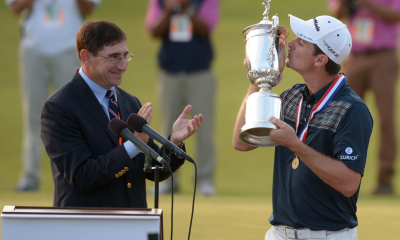

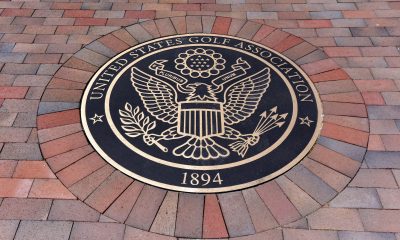

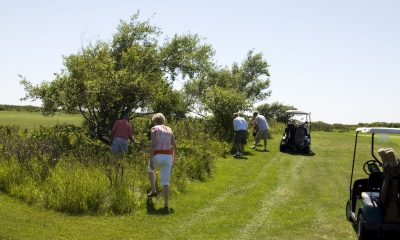

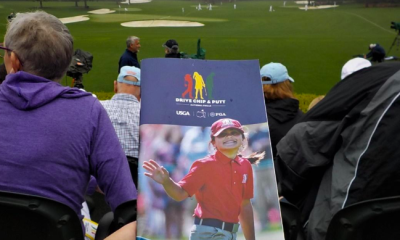

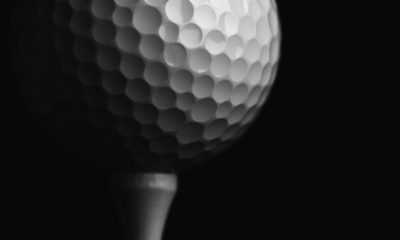










troy
Nov 12, 2012 at 12:21 pm
Great article Chris about the intersection of golf and technology. I agree with you — ultimately, the rules of golf are about integrity and self-regulation. You are expected to penalize yourself for infractions and as such each golfer should be trusted not to break the rules with their smart phones.
I believe in golf karma as well! You will pay for “cheating” and be rewarded for playing by the rules!
dapadre
Nov 12, 2012 at 8:02 am
Apologis for my misspellings.
dapadre
Nov 12, 2012 at 8:01 am
Nice article. Sometimes I think that we humans love to complicate VERY SIMPLE things. Um, why dont they simply create or approve/sanction a DMD application. Nowadays, this can be ctreated (application) at fractions of the cost. Thsi application would pnly relay distance. Problem solved or am I missing somthing.
tlmck
Nov 11, 2012 at 7:40 am
The USGA and R&A are so passe’. It is time for them to go away before they drive all others away.
Dane
Nov 11, 2012 at 5:25 am
Golfshot app is what I use too. It’s great, simple, useful and keeps all your stats.
ConradMacDonald
Nov 10, 2012 at 10:09 pm
Smartphones should be legal for all competition with the exception of professional tours where it is there job to play golf. For 99.9% of golfers they don’t make there money there and there work could call. In this day and age some people cannot take 4 hours off the phone. I play with many business owners that take calls all round because they have to, business comes before pleasure…
Mats B
Nov 10, 2012 at 4:18 am
Great article! We need to get this debate on top of the board. You mension a whole deal of great points and from different perspective.
I suggest we all put this article on our Facebook walls, Twitter accounts, and make a copy paste mail to our local golf club, our local golf union and national PGA society. USGA and R&A has simply made a mistake changing this rule or adding a change to the rule in 2012. It needs to be corrected sooner than later otherwise it will harm the development of the game and the growth of new players enthusiast joining the game. Which teenager shuts off his mobile phone and put it away for 4-5 hours? No one I know and they are the future for this game…. Todays society demand that you’re accessable almost 24/7, I’m not stating that it’s good, but it is reality. If we are not allowed using our phones on course, we simply don’t go out to the course. And while having your smartphone out there, why not try to use it for the best? Where players can choose themselves how much they want to engage in the game, point down scores and use statistics in order to improve their game and so on….. Why having isolated devices for each task or function, when the technique allows us to gather all we need and require in one device. It’s a time saver, using one device instead of having to go through a number of devices during a round of golf.
Wake up USGA and R&A, it’s time to realize that future won’t allow for silly roule changes simular to the changes you made last year, it will hurt the game of golf and the sport of golf, in a wider perspective than a few Manufacturers of DMD:s.
As a reply to your last question Nate, I use Golfshot to my iphone and it works great for me. Once you’ve got used to it, it’s simple, a time saver and gives you an increased awareness of you game and capabilities, if you use the functions for statistic.
Again, great article and great subject.
/Mats
Nate Leeds
Nov 9, 2012 at 9:31 pm
Great article with many interesting points I’ve never considered. I completely agree, the use of a smartphone should be allowed with the honest onus on us.
What is the best app to track stats? What kind of stats can I track?
Thanks in advance.
Nate
Princeton_TN
Nov 9, 2012 at 12:27 pm
I had the exact opposite hit me last week. While playing in a tournament my job called me on three different holes. I had to answer, it was my job! Of course it was a smart phone, and at the time I was leading the tournament or so I was told. After the conclusion of the three hole stretch that I had to talk on the phone, one of the rules officials came up to me on the tee box and informed me that a two stroke penalty was given to me for each hole in which I used my smart phone for phone calls in which I was inside the players ropes! WOW a stretch of holes I just went birdie, birdie and par were now bogey, bogey and double bogey! I asked for an explanation because I was using it for only the call, and was told by my caddie to shut up cause he thought that I should have been disqualified! None the less after words I was destroyed and ended up loosing the event by 8 strokes, I shot an 82 and 74 won the event! It was on holes 10, 11 and 12 and I was 3 over at the turn and had just gotten it to one over before the penalties were assessed… I mean really!!! I think that with the yardage books used today, range finders leagal for USGA and R&A play, why not allow the use of cell phones and any measuring devices that they can hold! It isnt as if only one or two would gain an advantage, because we all have access to them today!!!